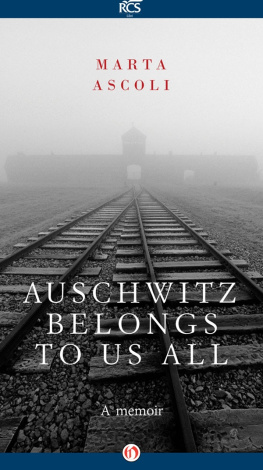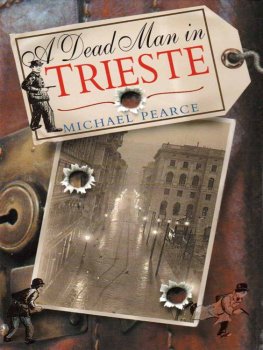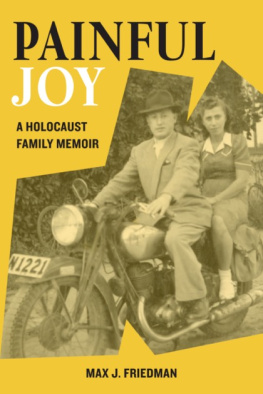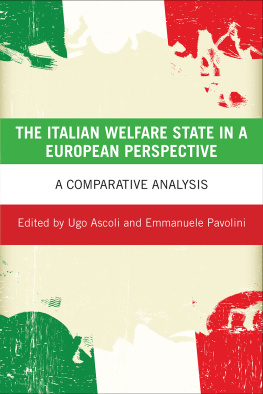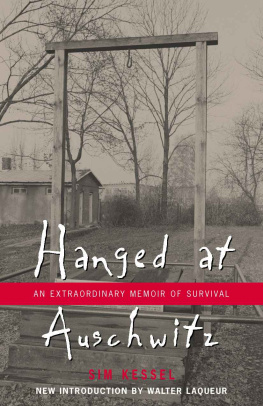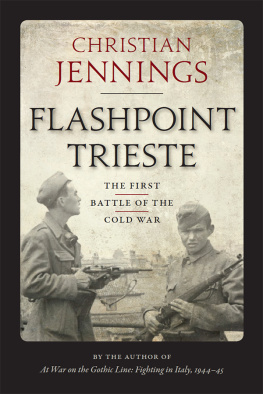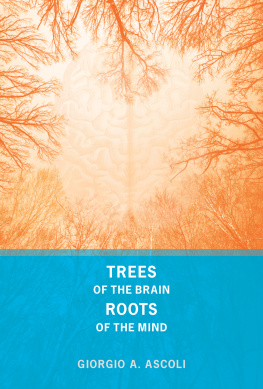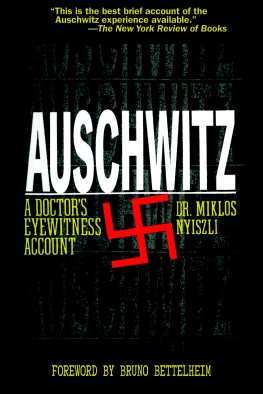Ascoli - Auschwitz Belongs to Us All: A Memoir
Here you can read online Ascoli - Auschwitz Belongs to Us All: A Memoir full text of the book (entire story) in english for free. Download pdf and epub, get meaning, cover and reviews about this ebook. year: 2013, publisher: RCS Libri/Rizzoli, genre: Non-fiction. Description of the work, (preface) as well as reviews are available. Best literature library LitArk.com created for fans of good reading and offers a wide selection of genres:
Romance novel
Science fiction
Adventure
Detective
Science
History
Home and family
Prose
Art
Politics
Computer
Non-fiction
Religion
Business
Children
Humor
Choose a favorite category and find really read worthwhile books. Enjoy immersion in the world of imagination, feel the emotions of the characters or learn something new for yourself, make an fascinating discovery.
- Book:Auschwitz Belongs to Us All: A Memoir
- Author:
- Publisher:RCS Libri/Rizzoli
- Genre:
- Year:2013
- Rating:3 / 5
- Favourites:Add to favourites
- Your mark:
- 60
- 1
- 2
- 3
- 4
- 5
Auschwitz Belongs to Us All: A Memoir: summary, description and annotation
We offer to read an annotation, description, summary or preface (depends on what the author of the book "Auschwitz Belongs to Us All: A Memoir" wrote himself). If you haven't found the necessary information about the book — write in the comments, we will try to find it.
Ascoli: author's other books
Who wrote Auschwitz Belongs to Us All: A Memoir? Find out the surname, the name of the author of the book and a list of all author's works by series.
Auschwitz Belongs to Us All: A Memoir — read online for free the complete book (whole text) full work
Below is the text of the book, divided by pages. System saving the place of the last page read, allows you to conveniently read the book "Auschwitz Belongs to Us All: A Memoir" online for free, without having to search again every time where you left off. Put a bookmark, and you can go to the page where you finished reading at any time.
Font size:
Interval:
Bookmark:
Translated by Ross Nelhams
Rizzoli


Authors Note
It is my intention to declare, for the benefit of anyone who might doubt my testimony, that everything I have described herein is the truth. If anything, I have deliberately left out many facts so that my story will not become oppressively bleak for readers. I must add that it was only after a long time that I was able to face this subject, one that had weighed silently on me for many years. In setting out to write my memoir, I knew that I would have to recall episodes so painful that they would dredge up from deep within me harrowing memories and grievous humiliations, suffered at that sweetest of ages when one still expects everything from life.
I put off the task for many yearstoo many, perhaps. But today, before the last survivors pass away and a veil of forgetfulness descends over the Nazi death camps and the genocide of the Jewish people, I too feel a sense of duty to contribute my testimony, aimed especially at those who do not believe that the Holocaust actually happened.
I dedicate this memoir to the memory of my father, who was killed on our arrival at Auschwitz, and to all those who never came back.
Trieste, March 1944. A school day like any other. I was in my last year of high school, studying to become a teacher; my class, Upper 3C, was quite hardworking. I and a couple of other girls competed for the best grades.
I was seventeen years old, and mine was a world of dreams and expectations. At that age we lived on illusions; everything pleased us and brought a smile to our lips.
I remember that month as being exceptionally mild. Spring was already in the air; every year, normally on the twenty-first of March, my parents would take me and my two brothers to a nearby plateau for a day out in the countryside.
The country was at war, but we were not much affected by it. My family was not wealthy; we didnt have any luxuries, yet we never lacked for anything essential.
I grew up in a family where two religionsCatholicism and Judaismwere observed equally, and for this reason, I have always been undecided as to which of the two to embrace. After all the suffering I went through because I was considered to be Jewish, I am more inclined toward Judaism, even though over time I have followed in the footsteps of my father, who was a freethinker.
My father had a cheerful nature; he was always in excellent spirits and had an infinite number of interests, including music, books, and photography. He had traveled extensively and spoke several languages. He was Jewish and came from a good family; to marry my mother, who was Catholic, hed had to overcome quite a lot of obstacles. In the end, though, my mother got her way and they were married in a church.
I attended school diligently and, in those days, had no interest in politics; I was not especially anxious about my future, mainly because Mussolinis racial laws had not yet affected us. But after September 8, 1943, everything changed.
The Operationszone Adriatisches Kstenland , or Operational Zone of the Adriatic Littoral, was established in Trieste two days later under the command of the Nazi high commissioner Gauleiter Friedrich Rainer. The Germans took control of the citys civilian government, imposing their laws and finding administrative authorities in key positions who were willing to collaborate with them. Thanks to information provided by fellow Italians serving on the Committee for Racial Defense, who obtained the names of Jewish families from public registry offices, we were identified as Jews.
A few days earlier, all the Jewish residents of the Gentilomo Rest Home had been taken away; they were of course all quite elderly and ailing. None of them ever came back, but their names are recorded on a plaque hanging on the portico in front of the rest home. At the time, nobody found out about it, because these things always took place secretly, in the dark of night.
I was in my room studying for a chemistry exam when they rang our doorbell. It was sometime past eight in the evening on March 19, 1944, a date I remember quite well. My mother opened the door and two black-uniformed SS soldiers, with their macabre insignia, forced us to go with them to provide information. One of them was very tall and slim, and his expression left no doubt as to his intentions.
Just then my father came home. He was in the habit of spending a few hours at the Caff Milano or the Stella Polare, where he would try his hand at chess. He, too, was ordered to leave with the SS soldiers, who then locked the door and pocketed the keys. Because I was so young, I had never yet known evil, and I still had faith in humanity; so I went with the soldiers along with my parents, certain that we would soon be able to straighten out the misunderstanding.
Subsequently, everything that we ownedespecially anything of value, such as prized cameras, precious coins, and jewelrywas taken away, and the apartment was emptied out completely.
To avoid raising the suspicions of passersby, the two Germans made us walk in front of them. After about two hundred meters, when we got close to the public gardens, they made us stop next to a truck covered with a tarpaulin. We were forced to get inside and found ourselves there with two more SS soldiers guarding a group of people whom we did not know, but who we later learned were Jewish.
We were taken to the outskirts of the city to a place called Risiera di San Sabba, where a death camp had been set up far from prying eyes. The Risiera had actually been a rice-husking factory prior to being transformed into a facility for the extermination of Jews, political prisoners, and partisans. The Risiera complex was vast: It included a guardhouse, the commandants quarters, and lodgings for the SS noncommissioned officers and Ukrainian workers. Opposite the entrance there was a five-story building that was used as a barracks with a canteen, infirmary, and armory.
Through an underpass one came to a second courtyard. Farther to the left there was a building where Jewish prisoners were held, and on its ground floor were tailoring and shoemaking workshops where some of the inmates worked. A large warehouse in the back contained all the goods plundered from the Jews.
The Risiera also served as a transit point from which Jewish prisoners were sent on to Auschwitz, to be exterminated, either immediately or after a few months, once they had become nothing but skin and bones and could be exploited no further. There were also tiny lightless cells in which prisoners awaiting torture were held, and where many suffered appalling ends.
As I would discover later, we were all condemned to die one way or another.
As soon as we got to the Risiera we were separated, with the men sent to one floor of the building and the women to another. We women were gathered together into a large room full of bunk beds, and each of us took one.
There were a lot of us in the room. Most of the women were of Yugoslav origin, but there were also some Italians. Out of all of them, my most moving recollection is of a very old lady named Mrs. Saraval, whom I spoke with after being drawn to her by her kindnessan unusual quality in such a place.
My mother and I were waiting to be interrogated, and the wait became more agonizing every day. The savage way in which they served us our paltry meals and the curse words they screamed out at us only deepened our fears. We realized that we were defenseless, and that we had entered an unfamiliar world where brutality reigned.
Font size:
Interval:
Bookmark:
Similar books «Auschwitz Belongs to Us All: A Memoir»
Look at similar books to Auschwitz Belongs to Us All: A Memoir. We have selected literature similar in name and meaning in the hope of providing readers with more options to find new, interesting, not yet read works.
Discussion, reviews of the book Auschwitz Belongs to Us All: A Memoir and just readers' own opinions. Leave your comments, write what you think about the work, its meaning or the main characters. Specify what exactly you liked and what you didn't like, and why you think so.

